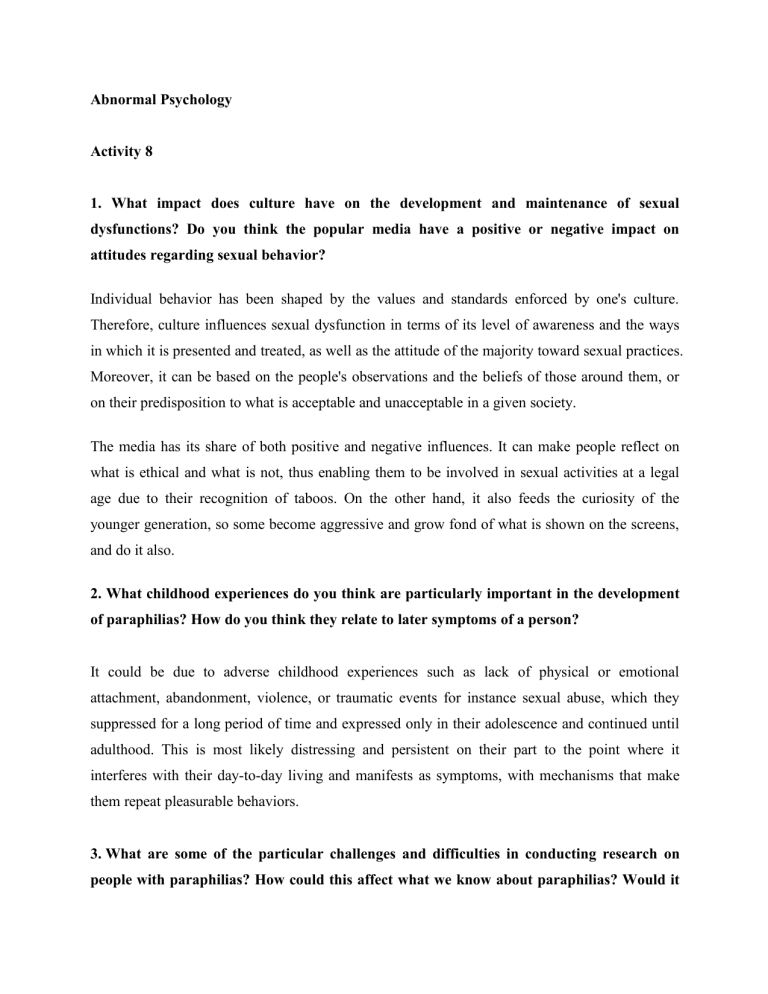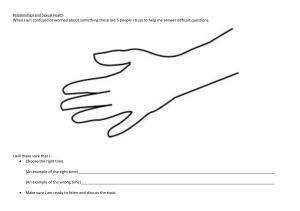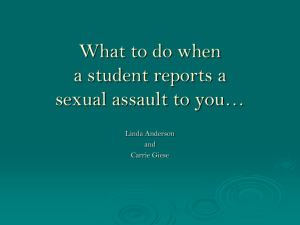Abnormal Psychology Activity: Sexual Dysfunctions & Paraphilias
advertisement

Abnormal Psychology Activity 8 1. What impact does culture have on the development and maintenance of sexual dysfunctions? Do you think the popular media have a positive or negative impact on attitudes regarding sexual behavior? Individual behavior has been shaped by the values and standards enforced by one's culture. Therefore, culture influences sexual dysfunction in terms of its level of awareness and the ways in which it is presented and treated, as well as the attitude of the majority toward sexual practices. Moreover, it can be based on the people's observations and the beliefs of those around them, or on their predisposition to what is acceptable and unacceptable in a given society. The media has its share of both positive and negative influences. It can make people reflect on what is ethical and what is not, thus enabling them to be involved in sexual activities at a legal age due to their recognition of taboos. On the other hand, it also feeds the curiosity of the younger generation, so some become aggressive and grow fond of what is shown on the screens, and do it also. 2. What childhood experiences do you think are particularly important in the development of paraphilias? How do you think they relate to later symptoms of a person? It could be due to adverse childhood experiences such as lack of physical or emotional attachment, abandonment, violence, or traumatic events for instance sexual abuse, which they suppressed for a long period of time and expressed only in their adolescence and continued until adulthood. This is most likely distressing and persistent on their part to the point where it interferes with their day-to-day living and manifests as symptoms, with mechanisms that make them repeat pleasurable behaviors. 3. What are some of the particular challenges and difficulties in conducting research on people with paraphilias? How could this affect what we know about paraphilias? Would it help or hurt? Their hesitations due to shame or discomfort cause people with paraphilic disorders to not be truthful and consistent in giving information openly to the interviewer. The data collected will be misleading and can be low in reliability, which will be difficult for both the researchers and the person suffering from the disorder. 4. What are the most important considerations in determining whether a person is a man or a woman? Are there things that matter other than genital characteristics? What they feel and how they behave. In this modern day society, regardless of one's gender, if an individual embraces themselves contrary to their sexual identity, this must be respected. Emotional and social aspects are worthy considerations. 5. If a client decided to have sex-reassignment surgery. What would be the potential advantages and disadvantages of making that change? What do you think you would do if you were in the same situation? A patient who has a sex reassignment procedure done will be able to have a better quality of life because they will not have to deal with the mental stress of being in the wrong body. Contrarily, they will face psychological and physical complications and be ridiculed by others. I will opt out of surgery and devote my time to other enjoyable pursuits without making any significant changes. I want my euphoria to be genuine and come from appreciating what I have, and as an indecisive being, I might regret my actions later on. So I would rather not carry it out. This goes for my own perspective. American Psychiatric Association. (2013). Diagnostic and statistical manual of mental disorders (5th ed.). https://doi.org/10.1176/appi.books.9780890425596 Home. Sex Change Surgery Guide : Pros Cons, Side Effects, Scars and After Care. (n.d.). https://medhalt.com/procedure/sex-change-surgery



